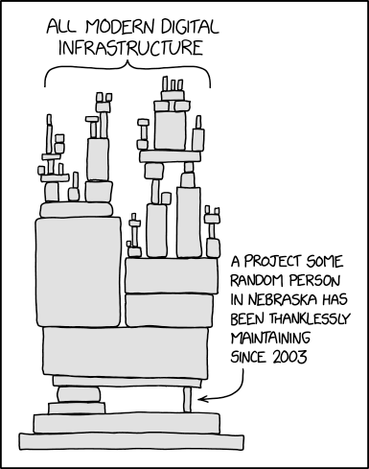That was the year that wasn't
 "It's not the despair," John Cleese's character in Clockwise moans as he lies by the side of the road, frustrated. "I can handle the despair. It's the *hope*."
"It's not the despair," John Cleese's character in Clockwise moans as he lies by the side of the road, frustrated. "I can handle the despair. It's the *hope*."
Two years ago at this time, we were seeing the first reports of a virus we hoped would not affect us. Last year at this time, after much grief and isolation, there was hope: vaccines! This year, many of us are vaccinated and we have some new treatments for this virus - but we are nonetheless facing a surge of a variant so contagious that normally-unflappable scientists sound frightened and holes are appearing in services we take for granted because so many people are either sick or isolating.
The result is that two years on we have vastly better tools and yet it feels like we've gotten nowhere after a fall when many had begun to believe it was nearly over. Last week, the Guardian reports4% of the UK population had covid. In the US officially there were 344,000 new cases; hard to assess its accuracy given the fragmented patchwork of US health care.
Yet we hope as we hoped last year: that this time *next* year, thanks to moves like the patent-free release and technology transfer of a new vaccine from Texas Children's Hospital, maybe the world will be far more widely vaccinated and maybe we'll be starting to see the end of this thing. (A someday child in history class reading this knowing what happened next may laugh...)
Meanwhile...
The computers, freedom, and privacy story for 2021 has had a lot of similarities with the covid story. We have much better tools, in the form of a US Federal Trade Commission led by noted antitrust reformer Lina Khan; the EU's power to issue fines over violations of the General Data Protection Regulation that are large enough to feature in companies' annual reports; sites like The Markup that are producing clever, technically-informed journalism that imposes transparency on companies in ways they don't like; and hosts of disaffected employees within those companies who are unionizing, leaking documents, and blowing the whistle generally.
And yet, so far nothing has really changed in any structural way. We've had surface tweaks. Twitter has banned posting people's pictures without their consent. Facebook's Oversight Board began operations, appearing to be composed of good people who don't want to be used as plausible diversions but are limited in their power to effect change.
All of that is on top of the story you could tell most years: governments are increasingly pushing for censorship of various kinds. Outages that should have been contained to single companies turned out to have knock-on effects all over the place. And the biggest companies - especially but not only Facebook - are seeing an increasing drumbeat pushing toward regulation, taxation, reformed and increased antitrust enforcement. Worse (from their point of view), their own employees are increasingly leaking documents and telling the world that some of our worst paranoid fantasies about how they operate are true.
So far, the only concrete punishment has been large fines relating to violations of either privacy law or competition law. In September, the EU fined WhatsApp $267 million for a lack of transparency about how it shares user data with other Meta subsidiaries such as Facebook. In November, Google lost its appeal against the EU's 2017 eyewatering fine of $2.8 billion over illegally favoring its own sites in shopping recommendations<./>. In July, Amazon's annual report revealed an EU fine of $877 million relating to cookie consent. In November, Italy fined Amazon ($77.4 million) and Apple ($151.3 million) for antitrust violations.
However, a new development: Russia has issued revenue-based fines against Google ($100 million) and Facebook ($27 million) for failing to remove banned content - chiefly apps, sites, posts, and videos relating to jailed opposition leader Alexei Navalny and his allegations of corruption at the top of Russian government. We've seen government censorship many times before; a fine this big seems to mark a new escalation.
This may be only the beginning; the UK's proposed Online Safety bill includes a provision for fines of up to £18 million or 10% of global turnover. Other new rules may be coming.
As we start 2022, the entertainment industry - or at least SnoopDogg and Paris Hilton - appears to be colonizing the "metaverse", which still sounds to me like any of a dozen things we have already. Second Life, or any of a number of game worlds.
Similarly, I can't see non-fungible tokens as the revolutionary concept some people seem to believe, at least as they have been used to date. I believe that with very few exceptions they will not improve the economic lot of starving artists. Based on personal experinece on the commercially-scorned folk scene, what matters is building and keeping an audience. I do not see how NFTs will help you do that.
But, as finance futurist Dave Birch pointed out in 2020 that digital currencies are being explored by serious people such as the Bank of England and central banks in China, Mexico, India, and many more. That is going to matter.
Happy new year.
Illustrations: Etsy seller DoubleECreations' 2021 dumpster fire Christmas ornaments
Wendy M. Grossman is the 2013 winner of the Enigma Award. Her Web site has an extensive archive of her books, articles, and music, and an archive of earlier columns in this series. Stories about the border wars between cyberspace and real life are posted occasionally during the week at the net.wars Pinboard - or follow on Twitter.



